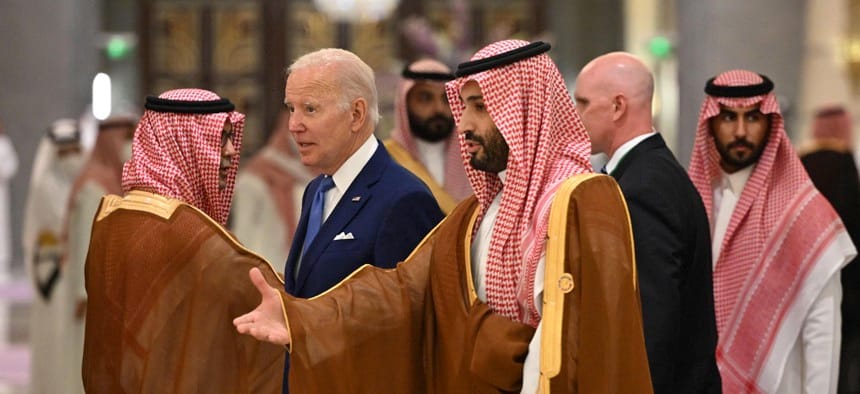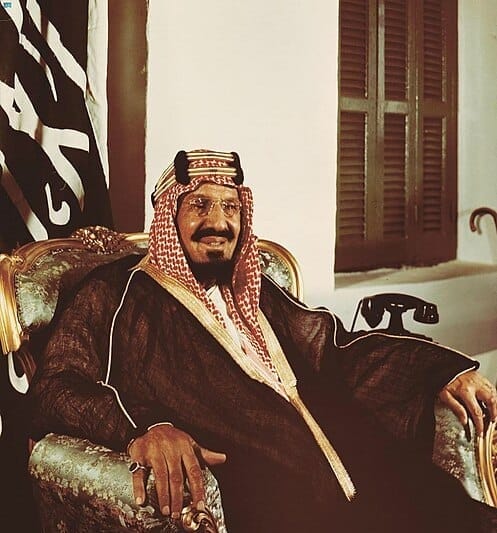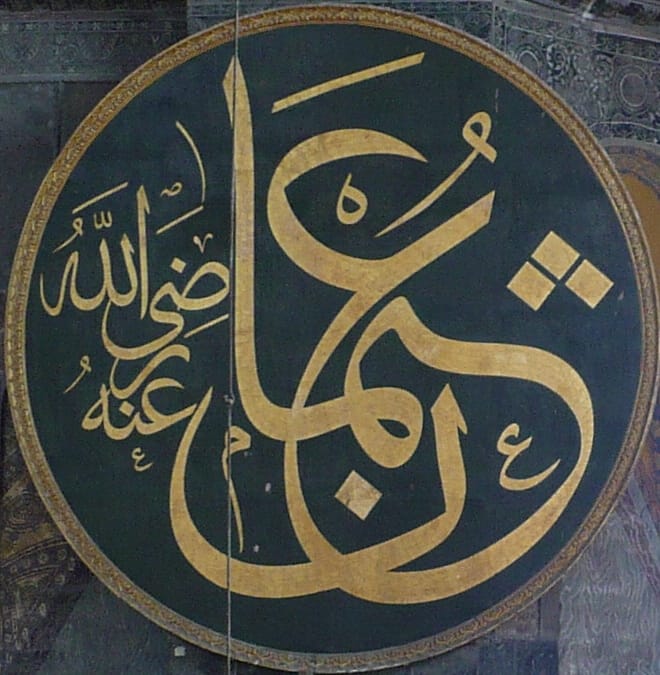Why the Saudi Defense Pact is Necessary in Ensuring America’s Leadership of the Free World

The US Defense Pact with Saudi Arabia is a unique opportunity to consolidate America's position in the Arabian Gulf region. This could be the crown jewel of Joe Biden's presidency, which has seen the highest number of wars around the world since 1946[1]. In this article, the merits of the US-Saudi Defense Pact will be analyzed in the context of the benefits it could potentially confer on traditional US allies in the region, including Israel, the Palestinian people, Egypt, and Jordan.
Elements of the US-Saudi Defense Pact
Saudi Arabia is asking for three things from their long-term allies:
1. Advanced military weapons
2. American investments into hi-tech sectors like artificial intelligence (AI) and quantum computing and
3. A civilian nuclear program[2]
In mid-2023, the Saudi authorities sought to use these demands as a bargaining chip for recognizing Israel. This came on the backdrop of many accusations leveled against the Saudis by the Biden administration.
Looking back now, after the October 7 attacks on Israel by Gazan militants and the killing of over 40,000 Gazans in the war that followed, Biden's accusations against Saudi Arabia appear trivial. The world is on the verge of more serious military action that could spiral out of control. Thus, the stakes for all parties – the US, Saudi Arabia, and the entire region are high.
Apparently, Saudi Arabia and the Gulf states have elected to remain neutral in the face of tensions between Israel and Iran[3]. However, with Iran's growing military might, its ballistic programs, and huge stocks of rockets, it is apparent that Riyadh has reason to be cautious.
Changed Dynamics on Normalization with Israel
Prior to October 7, 2023, it was fair to demand Saudi recognition of Israel before signing a major defense treaty that could lead to internal infightings. Thus, a Saudi-Israel diplomatic relationship was seen as a guarantee to ensure the goals of the Pact are met.

At the moment, the Saudi government is under pressure from its citizens to force Israel to end the war in Gaza quickly. On the other hand, the Saudi government's path towards a peaceful end of the conflict was assaulted by Hamas' brazen attack on Israel, which initiated the war. This attack was, at the very least, encouraged by the Iranian regime and its expansionist military units. Thus, the Saudi government has reason to stay back and hopes the conflict will be resolved quickly. After all, it is a direct confrontation between Israel and Iran with no immediate Saudi input.
On the other hand, some detractors continue to pressure the Biden Administration and Senate not to enter the US-Saudi defense agreement. They claim the Pact will lead to military adventurism and a nuclear arms race in the Middle East[4].
However, they fail to notice that the nuclear threat from Iran is much more apparent than it has ever been. In less than an hour, Iran could fire 180 rockets into Israel, thereby showing what they can do if they get a nuclear bomb. Thus, Saudi Arabia has reason to develop the necessary defense.
Ultimately, humanity can accept that deterrence has been the main outcome of the first weapons of mass destruction. Thus, Saudi Arabia’s three requests from their long-time ally are nothing more than the potential to deter attacks from opponents far and wide.
How Does a China-Saudi Defense Pact Sound Like?
Another dimension of the issue is that Saudi Arabia can seek new military and defense partners elsewhere. If the US will focus on trivial issues to avoid a long-term defense pact, Saudi Arabia will have to look elsewhere.
China is known for supporting friendly countries with complex military technologies in a no-questions-asked manner. China gave protection to Bashar Al-Asaad throughout the civil war, and could prove to be a more reliable military partner.
Thus, the Biden Administration will be better off, eliminating idealistic and abstract requirements to focus on the critical issues essential for regional stability and America’s global leadership.
We have already seen the Saudi crown prince, Mohammed bin Salman, negotiating with Putin to cut oil production to keep prices up. This was a show of Saudi Arabia's independence and capacity to contract as and how they wish. Thus, it is necessary to take a cue and make the best of the opportunity to close the US-Saudi Defense Pact before the sun sets on the possibilities.
On the Palestinian Issue: Saudis Leading State Incubation for Palestinians
Another opportunity that could arise from the US-Saudi defense pact is the application of a novel solution to Palestinian statehood.
Since 1947, every solution to the Palestinian statehood bid has failed.
And almost every known pathway to Palestinian statehood has sought to impose a Palestinian state from above through the leaders of sections of the Palestinian community.
A top-down approach to Palestinian statehood is not immune to cooption.
On the other hand, the Saudis can develop a strategic path towards statecraft for the Palestinian people. This will aim at creating a bottom-up approach which will ensure that Palestinians build strong institutions and a civil society that can pursue the greatest and best interests of the Palestinian people.
Once a system for Palestinian statehood starts at the grassroots, there can be the creation of a legitimate and functional state that can assert the Palestinian self-determination and autonomy.
Ultimately, the entire process must be underwritten by a potentate in the region. We all heard the supreme leader of Iran's Friday speech after they fired ballistic missiles at Israel in early October 2024. He openly encouraged Palestinians to use force and guaranteed that the Iranian Islamic Republic would rise against Israel again in violence in the future[5]. He made it clear that any court or international body that does not encourage Palestinian violence against Israel has no legitimacy.
What all this means is that Iran has lost their capacity to work with the Palestinians to build a functional state. At best, the state that Iran can lead Palestinians to form will lack legitimacy.
On the other hand, a more peaceful partner in the Islamic world, like Saudi Arabia, can lead the discourse to incubate a Palestinian commonwealth. Such a state must be functional and reflect the core elements of state legitimacy.
Furthermore, a future Palestinian commonwealth will have to be immune to cooption by states like Iran, which are known to sponsor terrorism. Therefore, the US-Saudi defense pact could open the door towards the empowerment of Saudi Arabia on the path towards the incubation of a Palestinian state by building the foundational structures.
Thus, the Pact allows Saudi Arabia to put their foot in the door to help consolidate international peace and global order.
Alternative: Both Walk Away and Continue to Cold War While Relying on the US in a Parallel Manner
The other possibility for Saudi Arabia is to walk away from all the possibilities and look elsewhere – maybe China or Russia.
Worse of all, Saudi Arabia could maintain a problematic stance by taking partial military aid from the United States and finding their way on other issues elsewhere. For instance, they can look out for partnerships from other countries like Pakistan to build their own nuclear program, which will accelerate the nuclear arms race with Iran.
Considering the longstanding relationship between Saudi Arabia and the United States, it will be tragic if the Saudis are forced out because of an over-idealistic set of reservations.
Benefits of the Deal to Biden’s Legacy
Current US President, Joe Biden, has failed internationally. His foreign policies have been ineffective and have caused more war and instability than at any time in history. Therefore, he has an obligation to do something to repair his image.
The US-Saudi will consolidate America’s influence in the Arabian Gulf region. This is a strategic region of the world and through it, there can be stability in the region for a long period of time.
Deterrence is an important component of this Pact which can maintain the balance of power in the region. Iran will be more cautious where there is a Saudi Arabia that can defend itself.
A US-Saudi Defense Pact will cause Israel and Saudi Arabia to improve their relationship and connection. That is because issues that come up between the two states can be resolved in Washington. This is something that will ultimately be to the credit of Joe Biden if it happens under his watch.
Saudi Arabia can accelerate their Vision 2030 goal alongside their satellite Gulf states. This will bring prosperity and contribute to peacebuilding in the region on many ways.
A Saudi Defense Pact will be worth it, if it will encourage the Palestinian people to position themselves on a path towards statehood. That is because an empowered Saudi royal household can underwrite the development of a prosperous and successful Palestinian statecraft that can promote peace.
Finally, any Palestinian state that will ever be formed will face risks of cooption. In this case, an empowered Saudi Arabia can lay the path towards a Palestinian state apparatus that can thrive beyond Iran’s cooption. And this process will only happen if Saudi Arabia has a comprehensive and reliable defense treaty with the United States.
Conclusion
The proposed defense pact between the United States and Saudi Arabia provides many possibilities for peace and stability in the Arabian Gulf region. The accusations and moral criticism of Saudi Arabia have been overshadowed by serious circumstances relating to the Gazan War. The realpolitik of the current trends makes it imperative for the Biden administration to take reasonable steps to ratify the treaty with Saudi Arabia to guarantee safety in the region and also accelerate the path towards a legitimate Palestinian state. Finally, Biden’s legacy could be greatly enhanced if he manages to push through the US-Saudi Defense Pact. If that were the only cogent thing Biden did in his presidency, it would be worth much more than the JCPOA, which has put the world on a path toward destruction in the past decade.
[1] Peace Research Institute Oslo (PRIO). "New data shows a record number of armed conflicts." Published: June 10, 2024. Available at: https://www.prio.org/news/3532
[2] Simon Henderson & David Schenker. "Saudi Arabia’s Nuclear “Asks”: What Do They Want, What Might They Get?" Published: August 15, 2023. Available at: https://www.washingtoninstitute.org/policy-analysis/saudi-arabias-nuclear-asks-what-do-they-want-what-might-they-get
[3] Maha El Dahan & Pesha Magid. "Exclusive: Gulf states sought to reassure Iran of their neutrality in Iran-Israel conflict, sources say". Reuters. Published: October 3, 2024. Available at: https://www.reuters.com/world/middle-east/gulf-states-sought-reassure-iran-their-neutrality-iran-israel-conflict-sources-2024-10-03/
[4] David M. Wight. "The U.S.-Saudi Agreement Is a Fool’s Errand" Foreign Policy. Published: May 29, 2024. Available at: https://foreignpolicy.com/2024/05/29/us-saudi-defense-deal-biden-mbs-nuclear-security-iran-election/
[5] Center for Israel Education. Ali Khamenei, Supreme Leader of Iran, Friday Sermon, October 2024. Available at: https://israeled.org/resources/documents/ali-khamenei-supreme-leader-of-iran-friday-sermon/




